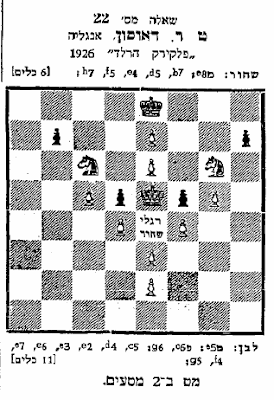 |
| Al Ha'Mishmar, Dec. 20th, 1945, p. 3 |
What was the first retrograde analysis problem published in the Israeli chess Al Ha'Mishmar was, as we noted before, started as a de facto problem column. Here, for example, is a problem Yechezkel Hillel, noted above. What was Black's last move? The column add that this problem, 'the result of much work', is in memory of Baruch Rauchner, of Kibutz Mizra, one of the 'top chess pioneers in the country. Can any reader solve it?
The paper previously published a retrograde-analysis problem, on Nov. 22nd the same year (p. 3), by the well-known British problemist Thomas Dawson, which is solved in detail in the Dec. 20th column, while explaining the term "retrograde". But Dawson's problem, as well as not being a Palestinian one, of course, is a mate in two, not a "pure" retrograde analysis problem. The retrograde analysis is necessary to show why the key -- 1.gxf6 e.p. -- is permissible (i.e., that Black's last move had to be Pf7-f5.) The diagram amusingly has been printed with the stopgap-text 'black pawn' on e4:
The same column (brought to our attention by a frequent correspondent) also notes an important event -- the re-opening of the Jerusalem chess club after the war, incidentally with 'Comrade Marcuze' as treasurer, with well known players (Mohilever, etc.) as members.
The paper previously published a retrograde-analysis problem, on Nov. 22nd the same year (p. 3), by the well-known British problemist Thomas Dawson, which is solved in detail in the Dec. 20th column, while explaining the term "retrograde". But Dawson's problem, as well as not being a Palestinian one, of course, is a mate in two, not a "pure" retrograde analysis problem. The retrograde analysis is necessary to show why the key -- 1.gxf6 e.p. -- is permissible (i.e., that Black's last move had to be Pf7-f5.) The diagram amusingly has been printed with the stopgap-text 'black pawn' on e4:
The same column (brought to our attention by a frequent correspondent) also notes an important event -- the re-opening of the Jerusalem chess club after the war, incidentally with 'Comrade Marcuze' as treasurer, with well known players (Mohilever, etc.) as members.

No comments:
Post a Comment